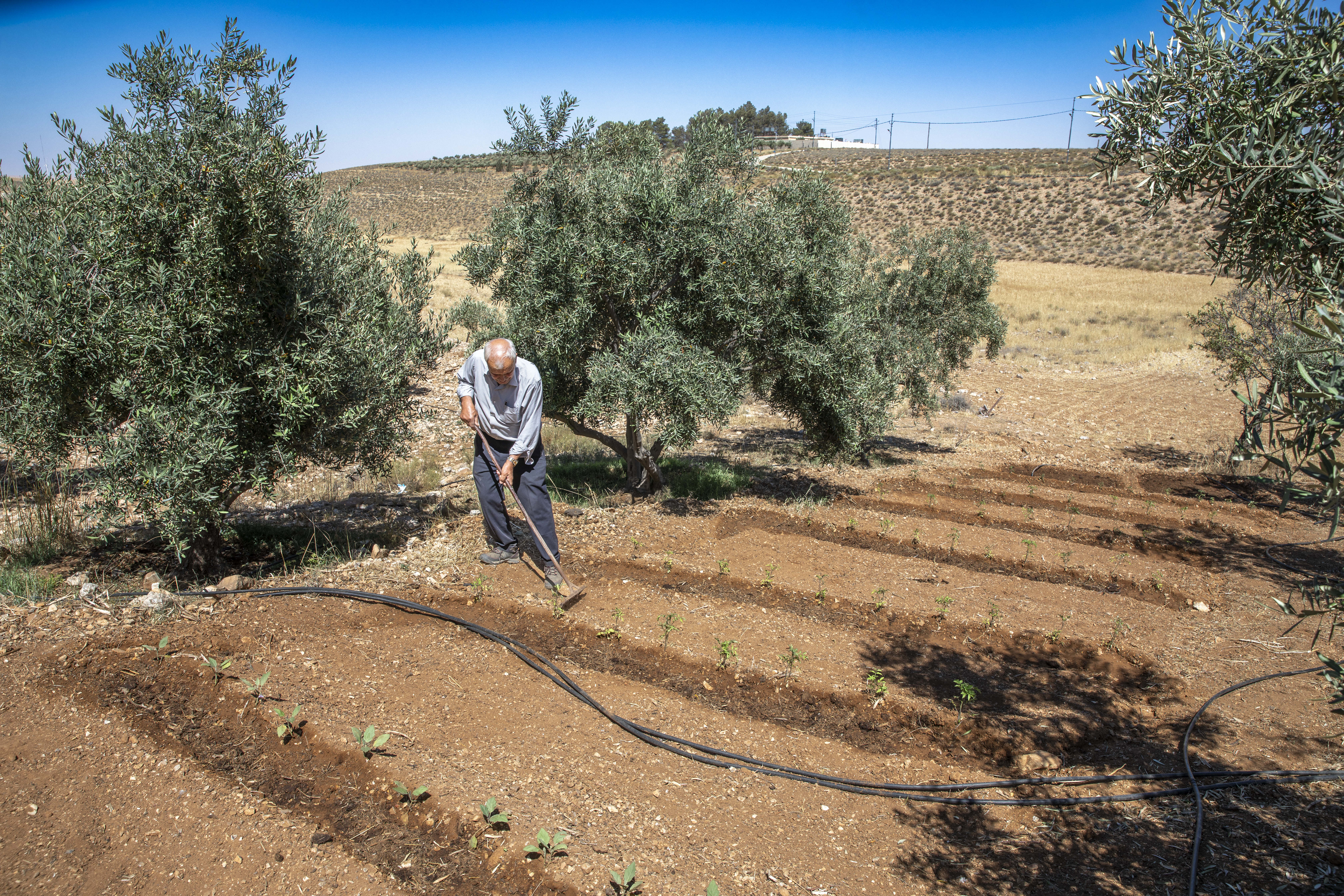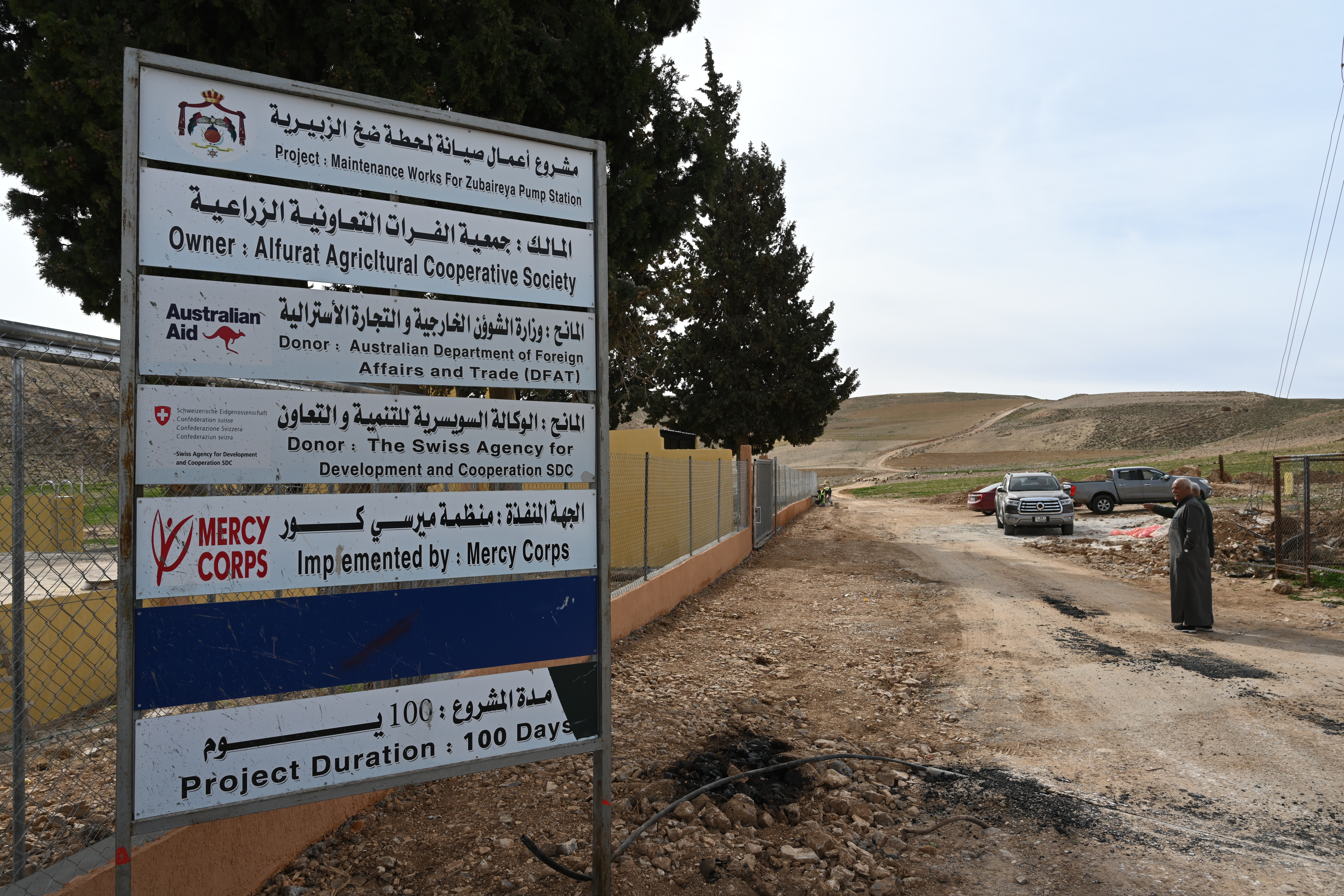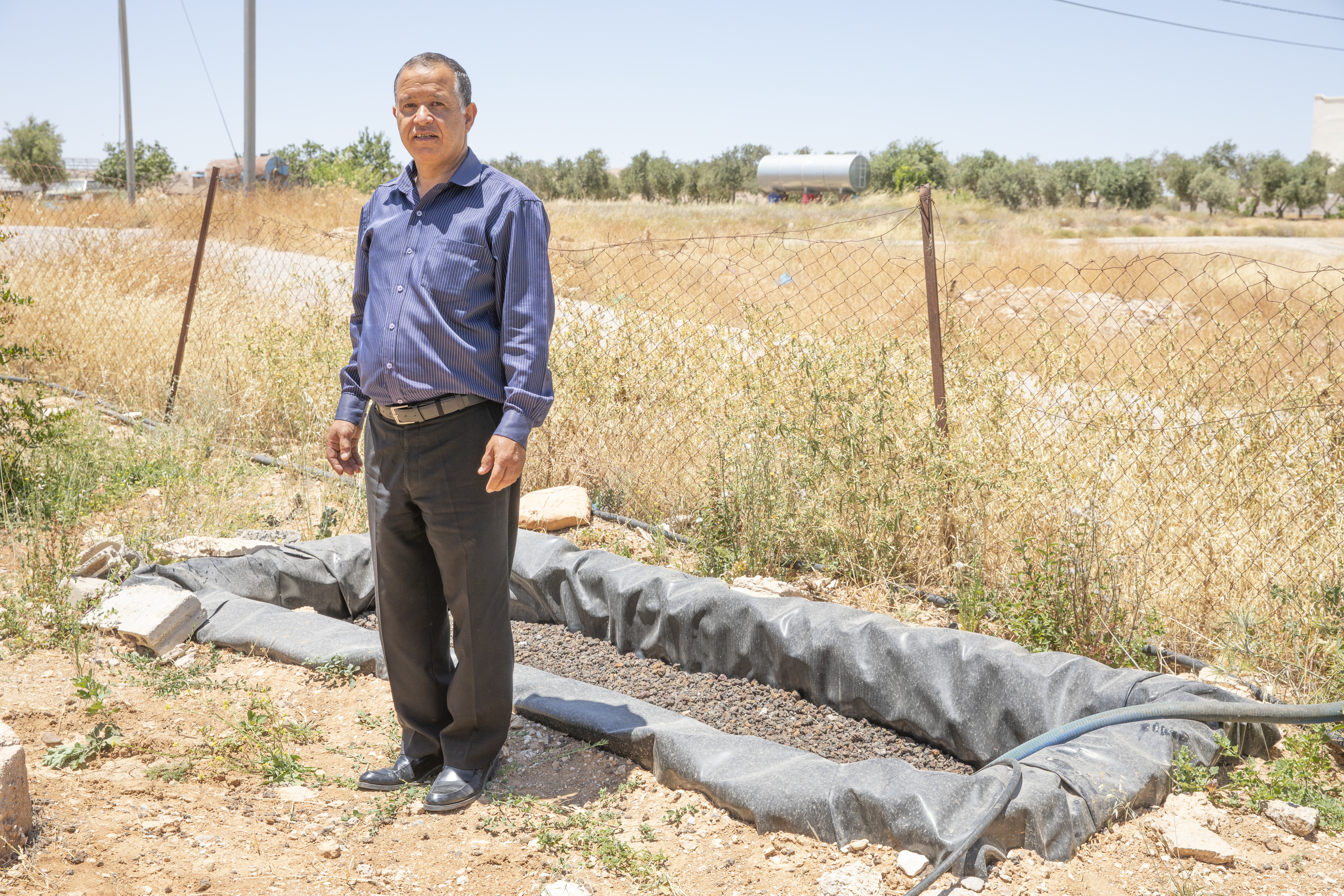
Is Swiss water aid for Jordan just a drop in the ocean?

No issue is as crucial for the Jordanian royal family as ensuring water for the population. Switzerland is trying to help, but how can a country not troubled by water scarcity help the desert nation?
A boy waves energetically. He is standing by the roadside, somewhere between the Jordanian capital Amman and the village of Zubarieya to the south, brandishing a hosepipe. He actually wants to get the cars to stop so that he can wash them – but in vain. So he sprays water in a high arc through the dry air, until it splashes down onto the warm ground.
“Many Jordanians don’t realise quite how badly the country is affected by water poverty,” says Alaa Alqaisi, a water specialist who has been working for the Swiss Agency for Development and Cooperation (SDC) for two years, as we drive past the boy. “So raising awareness among the population is a key aspect of our work.”
This is in part why Alqaisi is driving south on this January morning to visit an SDC project in Zubarieya. The dry surroundings bear testimony to the importance of every single drop of water for the kingdom.
The situation is certainly alarming. The Middle East is in the grips of a severe water shortage of “unprecedented” scale, according to a recent World Bank studyExternal link.
Jordan is particularly affected. The kingdom is one of the most water-scarce countries in the world. Declining rainfall, exhausted groundwater sources and severe droughts are causing the land to dry up, in large part as a direct result of the climate crisisExternal link.
Compounding matters, Jordan’s population has doubled in the past two decades to 11.5 million people, many of whom are refugees or the descendants of refugees. So not only is less and less water available, but more and more is needed.
And the longer the war in Gaza goes on, the more likely it is that Jordan and Israel will sever ties, further exacerbating the pressing water problem.
Switzerland is following developments closely, as it sees Jordan as an important hub for humanitarian aid and diplomacy in the region.
Precious resource
The Swiss delegation’s arrival is expected in Zubarieya. Representatives of the NGO Mercy Corps Jordan, the SDC’s project partner, are there, as is Abu Osama, representing the village. The elderly man is standing in front of the pumping station, his chequered shirt tucked neatly into his trousers. To his left are several large solar panels.
Today, he declares, the village is self-sufficient in terms of energy. “We’ve done a lot of work over the past months, including renovating the pumping station. Now the water supply works better.”
This is important, as the vital resource is pumped up from a groundwater source, which is managed by the community, before being distributed to the neighbouring households and farms.

All this must be done as efficiently as possible, as around 50% of water is often lost on the way to the end user, explains Zaid Hatokay, programme director at Mercy Corps. “Pumping systems in Jordan are often unreliable. We have improved things here.”
Water is also regularly stolen, for example when people cut the pipes and tap into them. The plant in Zubarieya is surrounded by a high wire fence. There is also a security guard who stays there overnight.
The SDC projectExternal link will run until the end of March, with Switzerland and Australia sharing the funding of around CHF1.8 million ($2 million) equally. After that, the aim is to continue the project with the help of local companies.
In the long term, the project seeks to “promote alternative governance structures for water management in rural areas with poor access to water from the national public grid”, the Swiss embassy in Amman said upon request.

Geographic dependence
Water scarcity remains a fact of nature that poses challenges for the country, as Maysoon Zoubi well knows. She has been working in the Jordanian water sector for decades and is now a water diplomacy expert at the engineering firm Arab Dar.
“Jordan is what is known in the technical jargon as a downstream country,” Zoubi explains. This means that the main rivers flowing through the desert nation rise in the neighbouring states, so-called upstream countries.
These can decide whether to dam the flow and thus withhold water from the downstream country, or let it pour freely into the neighbouring state. In other words, geography distributes negotiating power unequally between states when it comes to water.
Do you want to read our weekly top stories? Subscribe here
And, here, Jordan is clearly on the losing end. It used to be pushed around by its northern neighbour Syria, where the important Yarmuk River rises.
As Zoubi explains, the two countries negotiated an agreementExternal link back in 1987 which, among other things, laid down the framework conditions for a dam, which went into operation in 2011.
Some 80% of the construction costs for the dam, known as Al-Wehda (or Unity) Dam, was borne by the Arab Fund for Economic and Social Development. The remainder was split between Jordan and the United Arab Emirates.
Jordan also covered the other costs associated with the dam, “from planning to maintenance” as Zoubi explains, revealing Syria’s leverage over its neighbour. It was nonetheless agreed that Syria would allow 208 million cubic metres of water to flow into Jordan each year.

War in Gaza
Jordan also shares a groundwater source with Saudi Arabia, which is used intensively on both sidesExternal link. The relationship over water with Israel, meanwhile, has become particularly fragile since the war in Gaza.
Water can exacerbate interstate problems, but it is rarely the cause. Nevertheless, for King Abdullah II it is a make-or-break political issue. “Water is now at the heart of geopolitical tensions between Jordan and Israel,” Zoubi says.
Before October 7, 2023, Jordan and Israel were nudging undeniably closer, despite decades of rising tensions in the West Bank, where Israel has been steadily pushing ahead with the building of settlements, in violation of international law; and despite the opposition of the Jordanian people, many of whom have Palestinian roots and harbour a deep aversion to Israel.
First and foremost, the former enemies signed a peace treaty in this challenging context in 1994. Still in force today, the text also lays down rules for the use of water from the border river Jordan, the most important water source for Israel and Jordan.
Two water agreements were also negotiated. Jordan has been buying Israeli water (up to 100 million cubic metres annually) for years. Last October, a deal was due to be signed on the exchange of Jordanian electricity for Israeli water.
Important partner for Switzerland
But that all now seems like history. In the shadow of the war in Gaza, rapprochement is far from the order of the day. “Never before, not since the peace treaty was signed, has Jordan criticised the Israeli government so much,” says Zoubi.
More
Last November, Jordanian Foreign Minister Ayman Safadi declared it was currently “impossible to have any normal relations with Israel”External link. He had quickly recalled his ambassador from Israel in response to the escalation in Gaza. The Israeli government reacted sharply and is even threatening to turn off the water tapExternal link.
Yet despite this bleak scenario, there is still a glimmer of hope. Even as tensions increase across the region, work is afoot to strengthen cooperation on water policy and, in so doing, promote sustainable development and peace. This is how the Blue Peace initiative came into being in the region, with the involvement not just of Jordan and Syria, but also Iraq, Iran, Turkey and Lebanon.
Switzerland plays a key role in this cross-border water cooperation by facilitating dialogue between political decision-makers and taking other supporting measures.
The situation could soon improve in Jordan, too. In just three years, it should be possible to desalinate large amounts of water from the Red Sea and pump it to the capital, Amman, 450 kilometres away, and its surrounding regions – in a project that is costly and therefore not without controversy.
Despite the praise and enthusiasm of Abu Osama, the Zubarieya community representative, for the progress brought about in his village, Zaid Hatokay of Mercy Corps is convinced that “the key to a water-secure Jordan is the desalination of seawater”.
Edited by Sabrina Weiss. Adapted from German by Julia Bassam/ts

In compliance with the JTI standards
More: SWI swissinfo.ch certified by the Journalism Trust Initiative






























You can find an overview of ongoing debates with our journalists here . Please join us!
If you want to start a conversation about a topic raised in this article or want to report factual errors, email us at english@swissinfo.ch.